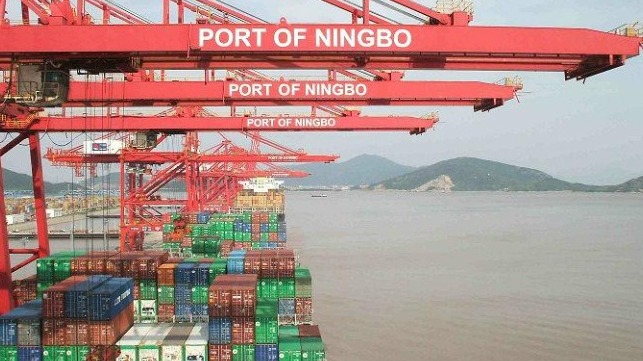
Maersk Cancels Six Ningbo Calls as World Watches for China’s Next Move

COPENHAGEN : With no indication from the Chinese authorities as to the timeline or plan for the resumption of operations at the closed container terminal in the Ningbo-Zhoushan port complex, the shipping lines have been left scrambling to come up with strategies to minimize the disruptions. At the same time, shippers who have already been struggling with bottlenecks, rising fees, and delays are waiting and watching and even the international financial markets are getting nervous about the potential impact.
Chinese authorities and the port operator said that they are awaiting further word from the local health authorities that on short notice ordered the terminal closed on August 11. Reports surfaced indicating the individual worker who tested positive had a negative test last week but came up positive at mid-week. The health authorities have only said that they were disinfecting the area and expanding testing. The individual reported lived in one of the dormitories for the port complex raising concerns that he could have been in close contact with other workers.
UK-based (re)insurance risk management consultant the Russell Group analyzed the port operations reporting that it believes “China’s partial closure of the port of Ningbo threatens $172 billion’s worth of global trade.” Among the biggest potential impacts, Russell points to $39.2 billion work of integrated circuit board exports. Many global companies had already reported shortages and increased wait times for electronic components which according to this data could be further exasperated by the closure of the Meishan terminal.
According to sources quoted by Argus, they are already seeing an impact on metal shipments and bunker fuel supplies. In addition to being China’s second busiest container port, the Ningbo-Zhoushan port complex is the largest overall port in the world handing not only containers but all forms of cargo.
The closure also appears to be having a quick impact on other ports of the port complex’s operations despite assurances from the Chinese port agents that all the other terminals were operating normally. A day after advising customers that vessels in the 2M alliance mainly call at other terminals Maersk cautioned that waiting time has already increased by up to half a day for a minimum now of two days.
Maersk is also now advising customers that six vessels on the route between Asia and South America were scheduled to call at the closed Meishan terminal. In August all six of those vessels will omit Ningbo and Maersk is advising customers to try to re-arrange for shipment via CMA CGM.
The average number of weekly calls to Ningbo has already plummeted 70 percent reports the logistics platform project44. Their analysis reports that from nearly 200 container vessels it fell to less than 60 vessels this week. “Ocean Carriers are diverting and initiating Blank Sailings to and from the port. project44 has recorded 37 blank sailings as of August 13.”
Based on these reports, the global financial markets are also getting nervous over the scope of the impact both from this closure while worrying if it could portent more COVID-related impacts to global trade. S&P reported today’s decline in the crude oil price citing the closure at Ningbo.
“Many experts are worried that the disruption may have a large impact on the holiday season, particularly in the US,” says Russell in its analysis. They reported that Ningbo exports 22 percent or $16 billion worth of exports to the US annually and their data shows, “that 11 percent or $8.3 billion goes to Long Beach, California,” which they noted is already experiencing a large surge in demand with a backlog of ships waiting to enter the port.
Russell is warning customers of the fragility of global trade saying that fragility means that any slight disruption to the network of trade, whether that be a closure of a port or a blockage of a shipping route, creates chaos for shippers, global supply chains, and ultimately consumers.
Source : The Maritime Executive


